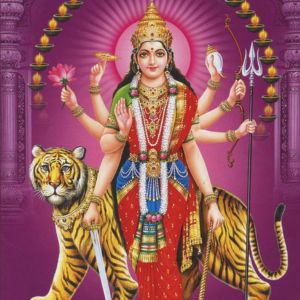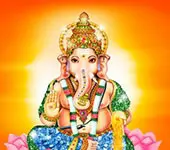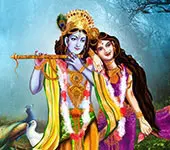This audio tells you about - 1. How only if you have dispassion, Bhagavan can take over you 2. Meaning of the term Bhagavan 3. How the twelve skandhas of Bhagavata relate to the six qualities of Bhagavan.
Quiz
How many sons did Lord Krishna have in total?Transcript
(Click here to read more)
Srimad Bhagavata when it classifies Suta, Narada, and Shukadeva into prathama, madhyama, and uttama kind of narrators is showing us a great principle about work: what should be your attitude towards whatever you do. All three are narrating Bhagavata from beginning to end. But Narada as a narrator is better than Suta. Shukadeva as a narrator is even better than Narada; he is the best. What is the difference between the three of them? This is not about the way they narrate, how interesting it is, or the oratory.....
Transcript
(Click here)
Srimad Bhagavata when it classifies Suta, Narada, and Shukadeva into prathama, madhyama, and uttama kind of narrators is showing us a great principle about work: what should be your attitude towards whatever you do.
All three are narrating Bhagavata from beginning to end.
But Narada as a narrator is better than Suta.
Shukadeva as a narrator is even better than Narada; he is the best.
What is the difference between the three of them?
This is not about the way they narrate, how interesting it is, or the oratory.
It is more about why they are doing it.
Suta is doing it as a profession.
He is a professional storyteller; a very accomplished storyteller.
But it is just a profession for him; just like how you go to the office and do your job.
He is doing it for a remuneration; not for money, for appreciation, name, fame, whatever.
Narada has no such expectation about personal gain.
But he still has a purpose.
He wants to change the world.
He wants to do good for the world.
There is a goal.
There is a desire associated with his narration.
There is an expectation.
He is better than Suta, but still not the best.
Shukadeva as a narrator has no desire for gain, nor any expectation of an outcome from his narration.
This is not carelessness.
Don’t get confused.
It is not that he is casual about it.
His rendering is exceptional.
His narration is passionate.
But he has dispassion towards the result.
Isn’t this what Geeta teaches: don’t compromise on the quality of the work.
Focus on the quality of work, not on the result.
Passion towards the quality of the work, but dispassion towards its result, benefit.
A pipe carries water from point A to point B which quenches the thirst of thousands of people.
Does it feel proud about what it is doing?
Does it expect appreciation for what it is doing?
It does its job very well, without expectation for any reward.
This is called vairagya; which, among the three only Shukadeva had to its perfection.
For Shukadeva: Bhagavan is carrying out something through me, either with a purpose or without a purpose, I don't know; that doesn’t matter to him.
He is just executing it with full passion.
That's all.
So even in bhakti, this is what is required.
Bhakti, where you have no gain for yourself, no expectation of any gain, but bhakti with full passion, full involvement, without any expectation in return.
This is the highest form of bhakti.
Bhakti not for your sake.
Bhakti for the sake of Bhagavan, like how a mother takes care of her newborn child.
Does she expect anything in return from the child? No.
Like that.
Here, it is not that Narada doesn’t have dispassion.
Of course, his dispassion is a crore times more than us, but not perfect like that of Shukadeva.
Narada still wants something out of it; not for himself, for the people of the world.
But in fact, if you look at it, it is Bhagavan only who didn’t give perfect dispassion to Narada.
Otherwise, we would not have had Bhagavata only.
Why would he go after Sage Vyasa and motivate him to write Bhagavata?
Bhagavan is a very strong energy, a very strong emotion itself.
He has to take over your mind completely.
If this complete takeover is to happen, then there should not be passion towards anything else in your mind,
Success, name, fame, gain: no such passion should be there.
Then passion towards him takes over and occupies the mind 100%.
This is the case with Shukadeva.
He had purna-vairagya; means he had no other agenda.
That was his quality.
Why is Bhagavan called Bhagavan? Because he has got bhaga.
What is bhaga?
The term bhaga denotes six qualities: jnana, dharma, vairagya, aiswarya, yashas, and shree.
Knowledge, always being right- righteous, dispassion, rulership, fame and abundance of resources.
If you see Bhagavata, it is an exposition of these six qualities of Bhagavan.
The first and second skandhas represent his omniscience, his jnana.
The third and fourth, his dispassion.
Skandhas five and six are about his righteousness, dharma.
Seven and eight are about his rulership, lordship.
Nine and ten are about his fame.
Eleven and twelve are about his wealth, shree.
See, Bhagavata is Bhagavan himself.
So it has to represent him in every way.
We have seen how the twelve skandhas are the twelve organs of his body.
This is about how Bhagavata represents his six qualities.
Recommended for you
Chandamama - August - 2006
 Click here to know more..
Click here to know more..
Invoke Durga: Mantra for Problem-Free Living

om kleem' sharanaagatadeenaartaparitraanaparaayane . sarvasyaartihare devi naaraayani namo'stu te kleem' namah' .....
Click here to know more..Ganesh Aarti

jaya ganesha jaya ganesha jaya ganesha devaa. maataa jaakee paarvatee pitaa mahaadevaa.paana charhem phoola charhem aura charhem mevaa. lad'uvana kaa ....
Click here to know more..
English Topics
Bhagavatam
Click on any topic to open
- 65 Bhagavan's External Deeds
- 64 Is the Body Yours?
- 63 What's So Great About The Stories Of Sri Krishna
- 62 What To Do If You Just Don't Have Interest In Bhagawan
- 61 Which God Should I Worship?
- 60 How To Observe Dharma Properly
- 59 Devotee's progress
- 58 Which Guruji Can You Trust
- 57 Bhagawan Is Beyond Human Comprehension
- 56 The Missing Piece: Why Your Spiritual Practices Are Not Working
Please wait while the audio list loads..
30
Ganapathy
Shiva
Hanuman
Devi
Vishnu Sahasranama
Mahabharatam
Practical Wisdom
Yoga Vasishta
Vedas
Rituals
Rare Topics
Devi Mahatmyam
Glory of Venkatesha
Shani Mahatmya
Story of Sri Yantra
Rudram Explained
Atharva Sheersha
Sri Suktam
Kathopanishad
Ramayana
Mystique
Mantra Shastra
Bharat Matha
Bhagavatam
Astrology
Temples
Spiritual books
Purana Stories
Festivals
Sages and Saints
